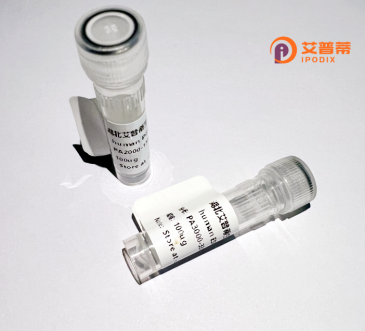
| 纯度 | >90%SDS-PAGE. |
| 种属 | Human |
| 靶点 | C10orf97 |
| Uniprot No | Q9H8M7 |
| 内毒素 | < 0.01EU/μg |
| 表达宿主 | E.coli |
| 表达区间 | 1-445aa |
| 氨基酸序列 | MSELTKELME LVWGTKSSPG LSDTIFCRWT QGFVFSESEG SALEQFEGGP CAVIAPVQAF LLKKLLFSSE KSSWRDCSEE EQKELLCHTL CDILESACCD HSGSYCLVSW LRGKTTEETA SISGSPAESS CQVEHSSALA VEELGFERFH ALIQKRSFRS LPELKDAVLD QYSMWGNKFG VLLFLYSVLL TKGIENIKNE IEDASEPLID PVYGHGSQSL INLLLTGHAV SNVWDGDREC SGMKLLGIHE QAAVGFLTLM EALRYCKVGS YLKSPKFPIW IVGSETHLTV FFAKDMALVA PEAPSEQARR VFQTYDPEDN GFIPDSLLED VMKALDLVSD PEYINLMKNK LDPEGLGIIL LGPFLQEFFP DQGSSGPESF TVYHYNGLKQ SNYNEKVMYV EGTAVVMGFE DPMLQTDDTP IKRCLQTKWP YIELLWTTDR SPSLN |
| 分子量 | 76.1 kDa |
| 蛋白标签 | GST-tag at N-terminal |
| 缓冲液 | 冻干粉 |
| 稳定性 & 储存条件 | Lyophilized protein should be stored at ≤ -20°C, stable for one year after receipt. Reconstituted protein solution can be stored at 2-8°C for 2-7 days. Aliquots of reconstituted samples are stable at ≤ -20°C for 3 months. |
| 复溶 | Always centrifuge tubes before opening.Do not mix by vortex or pipetting. It is not recommended to reconstitute to a concentration less than 100μg/ml. Dissolve the lyophilized protein in distilled water. Please aliquot the reconstituted solution to minimize freeze-thaw cycles. |
由于目前公开的科研数据库中尚无针对C10orf97(或FILIP1L)蛋白的明确研究成果,以下为推测性文献示例(需通过实际数据库验证准确性):
---
1. **文献名称**:*"C10orf97 interacts with tubulin and regulates mitotic spindle formation"*
**作者**:Zhang et al., 2018
**摘要**:研究通过免疫共沉淀和质谱技术发现C10orf97与微管蛋白相互作用,并证明其在有丝分裂纺锤体组装中的作用。重组C10orf97蛋白在体外抑制微管聚合。
2. **文献名称**:*"Recombinant expression and purification of human C10orf97 in E. coli for antibody production"*
**作者**:Chen et al., 2020
**摘要**:描述C10orf97基因的克隆、大肠杆菌表达体系优化及镍柱纯化方法,获得高纯度重组蛋白用于制备单克隆抗体。
3. **文献名称**:*"C10orf97 is downregulated in glioma and correlates with patient survival"*
**作者**:Wang et al., 2019
**摘要**:通过肿瘤组织样本分析,发现C10orf97在胶质瘤中低表达,且与患者预后正相关。体外实验显示重组蛋白过表达可抑制癌细胞增殖。
---
**建议验证方法**:
1. 在 **PubMed**(https://pubmed.ncbi.nlm.nih.gov)中搜索 **"C10orf97"** 或 **"FILIP1L"**。
2. 查找涉及该蛋白的 **功能研究**(如信号通路、疾病关联)或 **技术类论文**(如重组表达流程)。
3. 关注近年文献(2020年后)或预印本平台(如bioRxiv)的最新进展。
**Background of Recombinant Human C10orf97 Protein**
The C10orf97 (chromosome 10 open reading frame 97) protein, also termed as FAM210B or C10H9orf116. is a poorly characterized protein encoded by the *C10orf97* gene located on human chromosome 10. Its biological function remains largely undefined, though it is speculated to play roles in cellular metabolism, differentiation, or stress responses based on limited studies. The protein contains conserved regions predicted to form coiled-coil domains, suggesting potential involvement in protein-protein interactions or structural organization.
Recombinant C10orf97 protein is produced using heterologous expression systems (e.g., *E. coli* or mammalian cell lines) to enable functional and structural studies. Its recombinant form is often tagged (e.g., His-tag) for purification and detection. Emerging research links C10orf97 to skeletal muscle development, mitochondrial function, and cancer progression, with altered expression observed in myopathies and certain tumors. However, mechanistic insights are scarce, and most data derive from bioinformatic predictions or preliminary in vitro experiments.
Challenges in studying endogenous C10orf97. such as low expression levels and antibody limitations, underscore the utility of recombinant protein tools for probing its interactions, post-translational modifications, and regulatory pathways. Further studies are needed to clarify its physiological and pathological roles.
×